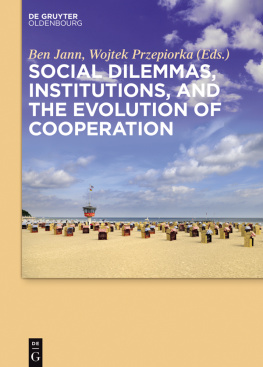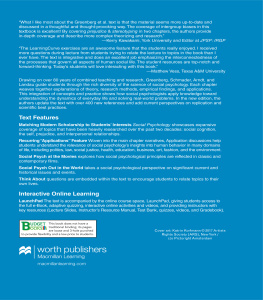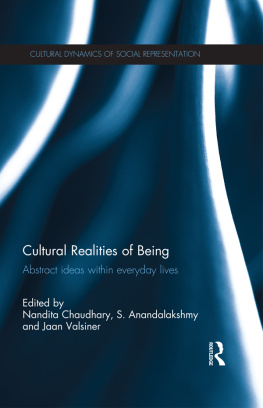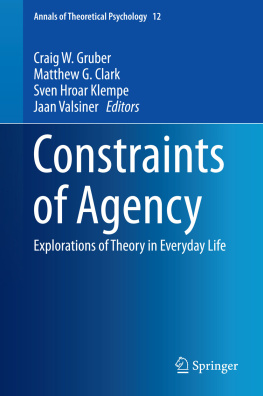PSYCHOLOGY AND THE CONDUCT OF EVERYDAY LIFE
Psychology and the Conduct of Everyday Life moves psychological theory and research practice out of the laboratory and into the everyday world. Drawing on recent developments across the social and human sciences, it examines how people live as active subjects within the contexts of their everyday lives, using this as an analytical basis for understanding the dilemmas and contradictions people face in contemporary society.
Early chapters gather the latest empirical research to explore the significance of context as a cross-disciplinary critical tool; they include a study of homeless Maori men reaffirming their cultural identity via gardening, and a look at how the dilemmas faced by children in difficult situations can provide insights into social conflict at school. Later chapters examine the interplay between everyday life around the world and contemporary global phenomena such as the rise of the debt economy, the hegemony of the labor market, and the increased reliance on digital technology in educational settings. The book concludes with a consideration of how social psychology can deepen our understanding of how we conduct our lives, and offer possibilities for collective work on the resolution of social conflict.
Ernst Schraube is Associate Professor of Social Psychology of Technology in Everyday Life in the Department of Psychology and Educational Studies at Roskilde University in Denmark.
Charlotte Hjholt is Professor of Social Psychology of Everyday Life in the Department of Psychology and Educational Studies at Roskilde University in Denmark.
PSYCHOLOGY AND THE CONDUCT OF EVERYDAY LIFE
Edited by Ernst Schraube and Charlotte Hjholt
First published 2016
by Routledge
27 Church Road, Hove, East Sussex BN3 2FA
and by Routledge
711 Third Avenue, New York, NY 10017
Routledge is an imprint of the Taylor & Francis Group, an informa business
2016 Ernst Schraube and Charlotte Hjholt
The right of Ernst Schraube and Charlotte Hjholt to be identified as the authors of the editorial material, and of the authors for their individual chapters, has been asserted in accordance with sections 77 and 78 of the Copyright, Designs and Patents Act 1988.
All rights reserved. No part of this book may be reprinted or reproduced or utilised in any form or by any electronic, mechanical, or other means, now known or hereafter invented, including photocopying and recording, or in any information storage or retrieval system, without permission in writing from the publishers.
Trademark notice: Product or corporate names may be trademarks or registered trademarks, and are used only for identification and explanation without intent to infringe.
British Library Cataloguing in Publication Data
A catalogue record for this book is available from the British Library
Library of Congress Cataloguing in Publication data
Psychology and the conduct of everyday life / [edited by] Ernst Schraube and
Charlotte Hjholt.
pagescm
1.Human behavior.2.Conduct of lifePsychological aspects.3.Social
Pychology.I.Schraube, Ernst.II.Hjholt, Charlotte.
HM1033.P84 2015
302dc23 2015005700
ISBN: 978-1-138-81511-7 (hbk)
ISBN: 978-1-138-81512-4 (pbk)
ISBN: 978-1-315-74689-0 (ebk)
Typeset in Bembo
by Out of House Publishing
CONTENTS
Charlotte Hjholt and Ernst Schraube
Ole Dreier
Karin Jurczyk, G. Gnter Vo and Margit Weihrich
Klaus Holzkamp
Tim Ingold
Thomas Teo
Darrin Hodgetts, Mohi Rua, Pita King and Tiniwai Te Whetu
Charlotte Hjholt
Ute Osterkamp
C. George Caffentzis
Silvia Federici
Ernst Schraube and Athanasios Marvakis
Frigga Haug
Dorte Kousholt
Ole Dreier, Department of Psychology, University of Copenhagen, Denmark and Lillehammer University College, Norway.
Silvia Federici, Hofstra University, United States.
Frigga Haug, Berlin Institute of Critical Theory, Germany.
Darrin Hodgetts, School of Psychology, Massey University, Auckland, New Zealand.
Charlotte Hjholt, Department of Psychology and Educational Studies, Roskilde University, Denmark.
Klaus Holzkamp (19271995), Department of Psychology, Free University Berlin, Germany.
Tim Ingold, Department of Anthropology, University of Aberdeen, Scotland.
Karin Jurczyk, German Youth Institute, Department of Family and Family Policies, Munich, Germany.
Pita King, School of Psychology, Massey University, Auckland, New Zealand.
Dorte Kousholt, Department of Education, Aarhus University, Denmark.
Athanasios Marvakis, Department of Education, University of Thessaloniki, Greece.
Ute Osterkamp, Department of Psychology, Free University Berlin, Germany.
Mohi Rua, School of Psychology, University of Waikato, Hamilton, New Zealand.
Ernst Schraube, Department of Psychology and Educational Studies, Roskilde University, Denmark.
Thomas Teo, Department of Psychology, York University, Toronto, Canada.
G. Gnter Vo, Department of Sociology, Chemnitz University of Technology, Germany.
Margit Weihrich, Department of Philosophy and Social Science, Augsburg University, Germany.
Tiniwai Te Whetu, School of Psychology, University of Waikato, Hamilton, New Zealand.
Charlotte Hjholt and Ernst Schraube
This book is about the psychological study of the conduct of everyday life in contemporary society. Presenting a body of critical and interdisciplinary work, it takes psychological theory and research practice out of the laboratory and into the real world. With its focus on the question of how human beings as active sensuous subjects live their everyday lives, it explores the conduct of life as a basis for understanding the dilemmas and contradictions we are confronted with in our daily lives.
From the earliest days of its formation as an independent discipline, psychology has been concerned with human experience, activity and self-reflection, but the question of how to conduct ones life has not received much attention. The growing awareness of this discrepancy over recent years has turned discussions within psychology toward the practice of everyday living and the concept of conduct of everyday life is getting incorporated into psychological theory and research practice. The importance of the conduct of everyday life for psychology lies in its conceptual relevance in exploring and understanding the everyday activities of individual subjects to organize, integrate and make sense of the multiplicity of social relations and contradictory demands in and across the different contexts in which they are engaged in their daily life. The concept takes into account how people collaboratively produce and reproduce their life through daily activities, habits, routines and personal arrangements of things and social relations. It directs attention to the social conditions in and with which people act, participate and live their everyday life and includes the question of how people are subjected to socio-material dispositions of power, knowledge and discourse. Furthermore, it facilitates an exploration of emerging new ways of everyday living and how these contribute to remaking the social world. Hence, working with the conduct of everyday life and refining this concept can support an understanding of psychological phenomena as they unfold in the reality of everyday living, and promote a fundamental renewal of psychological theory, methodology and practice.













